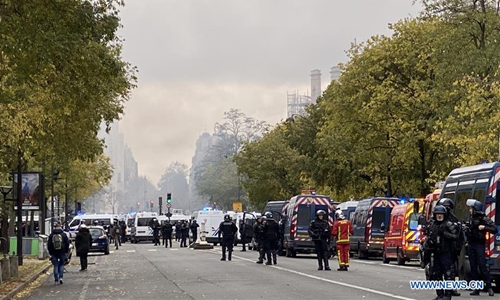The year 2019 can be described as "the year of populism." In France, Lebanon and Chile, protesters took to the streets to rally against a fuel tax increase, a social media tax, or subway fare hike. They resorted to violence, which undermined their countries' rule of law, slowed down reforms and increased the time and costs required to adjust economic and social order.

Policemen and firemen are seen during the Yellow Vest demonstration at Place d'Italie in the 13th arrondissement, Paris, France, November 16, 2019. Violence erupted in Paris where Yellow Vests movement staged a fresh action to mark its first anniversary amid continued social unrest over President Emmanuel Macron's economic reforms. (Photo: Xinhua)
There have also been radical protests in London, Catalonia and Hong Kong. These protests have gone beyond the scope of rule of law and democracy, turning into violent attacks against those holding divergent opinions. These practices reveal the irrationality and destructive potential of populism.
Democratic globalization, a social movement toward an institutional system of global democracy, has been a phenomenon of US global expansion after World War II. However, the US and non-governmental organizations engaged in assisting democratic development have severely underestimated the populist risks of democracy and the unequal order of global governance. Democratic globalization has not obtained sustainable results, but has been undermined by populism. Not being limited to countries in democratic transition, the destruction has also affected countries and countries that are viewed as example of democracy and rule of law.
What 2019 has seen is "populist globalization." Populism has the following common characteristics. First, violent protests hide behind the democratic notion and abuse the political freedom provided by democracy.
Second, the unlawful activities of protesters pile pressure on authorities in an attempt to urge governments to undertake significant political reforms to meet their requests, which impairs rule of law and representative democracy.
Third, the protests have seen external intervention and protesters tend to copy radical activities they come across on the internet.
Fourth, the trend of anti-globalization based on localism has been increasingly prominent. Protests against an unfair order of globalization led them to prioritize local interests, damaging the basic order and sustainability of globalization.
Fifth, these protests show the trend of decentralized social movement leadership in the internet era, ratcheting up the difficulties for the police to rebuild social order.
This round of democratic populism is related to widespread social protests and decline of Europe and the US. The UK and the US have been leaders of international order after World War II. However, the cost for the upkeep of globalization has been high, and both countries are reluctant to bear the burden. Therefore, interest groups and the elites of the two countries seek to continue their leading positions by the means, such as Brexit, withdrawing from multilateral institutions and trade war.
Since ancient Greece, classical philosophers observed and analyzed the principle and destructiveness of populism. However, the lessons from those times seem to have been forgotten by the people who are confused about democracy and populism in today's politics.
Both Plato's and Aristotle's theories indicate that the damage to democracy leads to tyranny. There is no serious discussion about risk and destruction wrought by populism in Western media and politics. When democracy becomes an ideology, what people talk about is its glorious past, contribution and the rightfulness. Lack of discussions about its risks, and the backlash it generates shows that people's mind and values on democracy are far from mature.
Having suffered from a year of populism, all humanity needs to undertake is a serious reflection of the damage by extreme anti-authoritarianism, anti-globalization and acts against rule of law: Does the constant violence against people with different ideas conform to the principle of democracy? Can democracy be above the fundamental values, laws and human rights shared by humanity? Is election under the threat of violence a true representation of people's will? Will only democratization bring freedom, order and development to developing countries? Faced with the continuous damage and destruction by populism, should the Western countries simply sit idly and watch or should they take the responsibility to fight for the common interests of all mankind?
All in all, 2019 was a year that reflected many illnesses of democracy. Populism is a shared threat to the whole world, destroying all the virtues and orders in life. But it can still be dealt with when all countries start to cooperate in an orderly way. However, if the countries in the name of democracy do not control the spread of populism, they will harm the rule of law and globalization. Since the emergence of populism has been caused by the West's indulgence of democracy, these countries have to take responsibility for restoring social orders.
The author is an associate professor at Beihang University in Beijing and Standing Member of Beijing Association of Party Regulations Studies.


